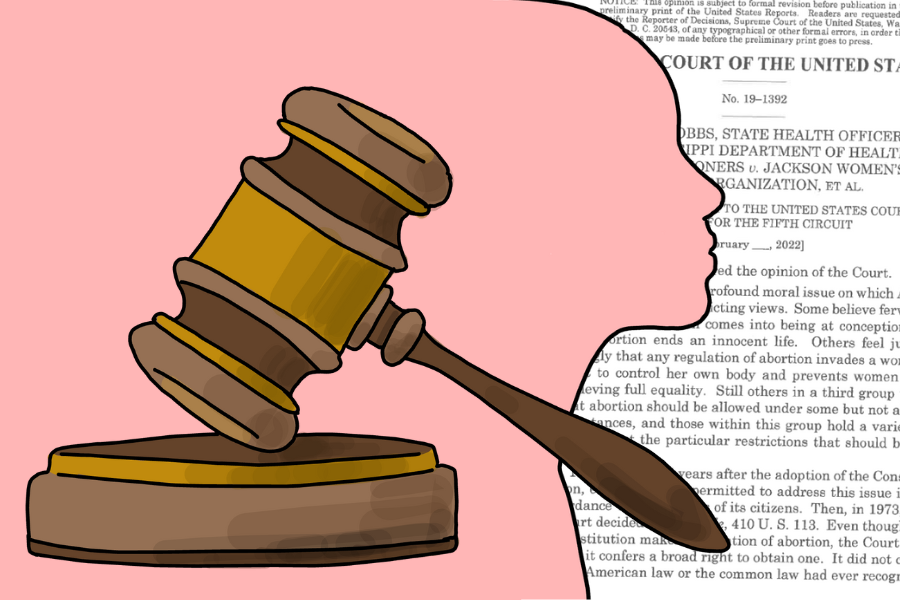Northwestern professors, researchers react to leaked Supreme Court draft opinion overruling Roe v. Wade
Some historians, legal experts and graduate students at Northwestern said they are concerned about a leaked draft opinion by Supreme Court Justice Samuel Alito.
May 5, 2022
As the Supreme Court stands poised to potentially overturn the landmark 1973 Roe v. Wade ruling, some members of the Northwestern community are concerned about the lasting impact the decision could have.
On Monday night, Politico published a leaked draft opinion by Justice Samuel Alito that would strike down the freedom to have an abortion without excessive government restriction. Though the decision has not yet been finalized, a ruling consistent with the leak would reverse protections that have been in place for nearly 50 years.
When history Prof. Kate Masur read the opinion, she said she felt physically sick. Though Masur said she expected this court to weigh in on precedent set by Roe v. Wade and Planned Parenthood v. Casey, the court could have limited the rulings’ protections rather than entirely overruling precedents set by both cases.
“Seeing it there in a news story, in a draft opinion, was shocking,” she said.
While Masur emphasized Roe is still the law, if the eventual ruling resembles the leaked draft, she said the consequences will be immediate and tangible.
According to the New York Times, 13 states have passed “trigger laws” since 1973 that would immediately outlaw abortion if the Supreme Court allowed it. Five additional states once had abortion bans that could be reinstated if Roe v. Wade is overturned, and 14 states could ban abortions that occur before a fetus can even survive outside the uterus.
Abortion will likely be criminalized in about half of all states, Masur said.
Second-year mental health counseling graduate student Dara McGee, who is also a graduate programming and research coordinator at the Women’s Center, said she was “devastated” when she saw news of the leaked draft.
As an Afro-Indigenous woman, she said she is frightened of how the eventual ruling could impact historically underprivileged people. McGee said she is particularly concerned about the potential mental health ramifications if the court rules in line with its draft.
“People forget that the brain is definitely interconnected with the body,” McGee said. “When you aren’t able to get the resources for the rest of your body, whether that be hormone therapy during a pregnancy, help during a miscarriage … It takes a toll on your mental health. I’m afraid that people will start to feel helpless.”
Wealthy people were able to access abortion even before Roe v. Wade, Masur said. They were often able to travel to states where the procedure was legal or procure a favor from a personal physician.
Masur said an inequitable healthcare system has prevented many Americans from access to such medical care. This has left many people with two options: carry an unwanted or unviable baby to term, or seek out an illegal abortion.
“This is where many people, and predominantly both women of color and poor women and very young women, ended up seriously injured or sometimes dead,” she said. “Because they sought out illegal abortions or tried to perform abortions on themselves, and something went wrong.”
These limits will dramatically increase travel between states for people seeking abortions, according to Joanna Grisinger, NU’s director of legal studies.
“Some states seem to already be moving toward penalizing and criminalizing going to another state for an abortion, which raises some really interesting federalism questions about what is and isn’t an imposition on one state’s ability to have a legal abortion,” Grisinger said. “There will almost certainly be immediate litigation there.”
Still, neither Grisinger nor Masur said they thought a ruling in line with Alito’s draft opinion would stop abortions from occurring nationwide. Instead, a reversal of Roe v. Wade would disenfranchise people with fewer means.
Abortion is not the only question brought forward by overruling Roe v. Wade. Grisinger said the ruling, if executed, could bring Griswold v. Connecticut into question as well.
Griswold establishes unenumerated fundamental rights under the due process clause of the 14th Amendment, according to Grisinger. The fundamental rights to contraception, intimate association, guarantees about same-sex marriage and other matters of personal privacy could all come under scrutiny, she said.
Still, Masur said the outpouring of support she has seen for Roe v. Wade and the right to choose has given her some comfort since she first read the leaked opinion.
Some reproductive justice advocates have been preparing for a potential overturn of Roe v. Wade for a long time, according to Masur.
“There is power in numbers,” she said. “Poll after poll shows that a majority of Americans support the right to choose to terminate a pregnancy, and the majority of Americans do not support a ban on abortion,” she said.
Email: [email protected]
Twitter: @avanidkalra
Related Stories:
— Captured: March to Defend Abortion Access assembles in downtown Chicago
-— SHAPE hosts abortion rights organizations, panelists discuss access
-— Personal PAC pushes for repeal of Parental Notice of Abortion Law


